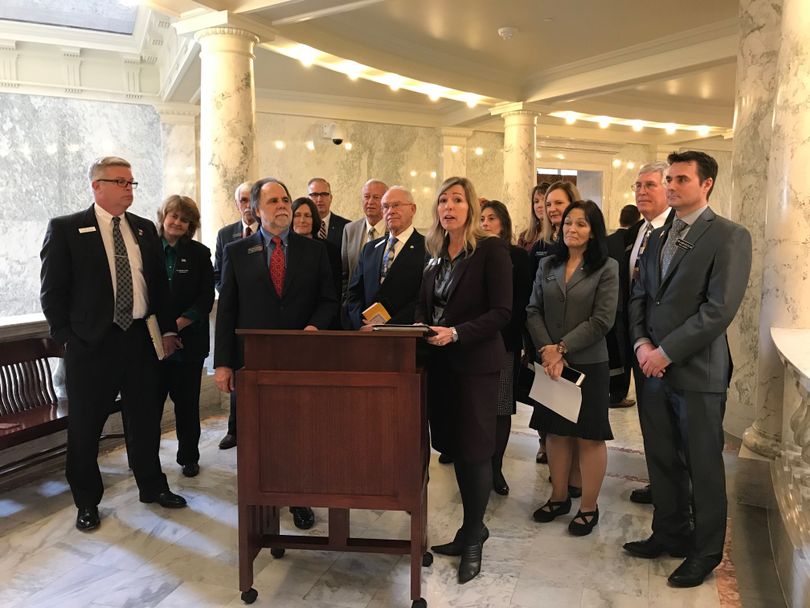Lawmakers launch push to examine Idaho’s occupational licensing rules

More than a dozen GOP lawmakers, including two senators, held a news conference today in the Capitol to announce that they’re forming a “Regulatory Reform Joint Subcommittee” to examine the rules and regulations of state licensing boards and look for ways to streamline them. The panel, to be co-chaired by Rep. Gayann DeMordaunt, R-Eagle, and Sen. Todd Lakey, R-Nampa, will be a subcommittee of the House Business Committee and the Senate Commerce Committee.
Rep. Vito Barbieri, R-Dalton Gardens, the House Business chairman, said he hopes the group can help with “streamlining rules and regulations with regards to licensing, eliminating rules and regulations with regards to licensing, and of course looking at the regulations to make sure that they’re not anti-competitive.” He and Sen. Jim Patrick, R-Twin Falls, the Senate Commerce chair, said the panel will consist of three majority members and one minority member from each house’s committee, and will invite state regulatory boards to appear before it to detail the licensing rules and regulations specific to each industry.
DeMordaunt cited a Cato Institute report that found that nationally, just 5 percent of U.S. jobs required licensing in 1950, but 30 percent do today.
House GOP Caucus Chairman John VanderWoude, R-Nampa, who participated in the news conference, said, “Most of the time, we’ve waited ‘til an interim committee” to launch a legislative study panel. “We’re all here, so I think it’s an excellent opportunity to get that subcommittee started. It gives it a lot more push to move forward.”
DeMordaunt said, “I think it speaks to the seriousness with which we’re addressing the issue.”
They’re not the only ones. Last May, while serving as acting governor while Gov. Butch Otter was out of state, Lt. Gov. Brad Little signed an executive order to launch a review of Idaho’s occupational licensing requirements, after a big legislative fight in 2017 over changes to cosmetology licensing resulted in a bill that ended up being vetoed by Otter. “To my knowledge, we have never reviewed many of these licenses,” Little said then. “From this last legislative session, it’s clear that we need to take a comprehensive look at our practices, and how and why they were implemented.”
Little, who is running for governor in 2018, titled his executive order the “Licensing Freedom Act.” Under it, state agencies are required to submit a report to the governor’s office by July 1, 2018, assessing whether existing occupational licensing requirements are necessary and in the public interest, and also addressing recommendations for improvement, modification or elimination.
Asked about that, DeMordaunt called the legislative move “complementary to the effort – it’s the Legislature’s approach to that.” Barbieri said the panel will engage directly with licensing boards, “rather than just a report.”
The Idaho Freedom Foundation has made objections to occupational licensing rules in Idaho a centerpiece of its agenda, downgrading lawmakers in its “Freedom Index” scores for them if they support increases in occupational licensing rules of any type or oppose rollbacks in those rules. For example, the group is rating HB 457, a bill proposed this year by the Idaho Real Estate Commission to require licensed real estate agents to complete a required continuing education course within six months of their initial licensing, rather than the current requirement of two years, a “minus-2” on its “Freedom Index.”
The commission said completion of the course is “essential to ensure licensees possess the knowledge, skills, and competency necessary to function in the real estate business.”
The Freedom Foundation, in its analysis for its index, said, “Pushing up this requirement would restrict the options available to licensees.”
